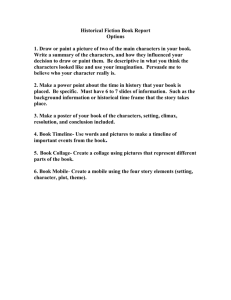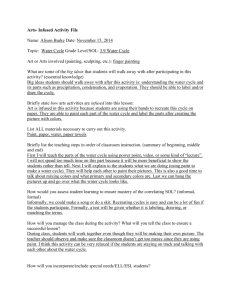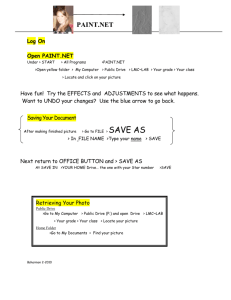ry Storm Water Pollution Prevention
advertisement
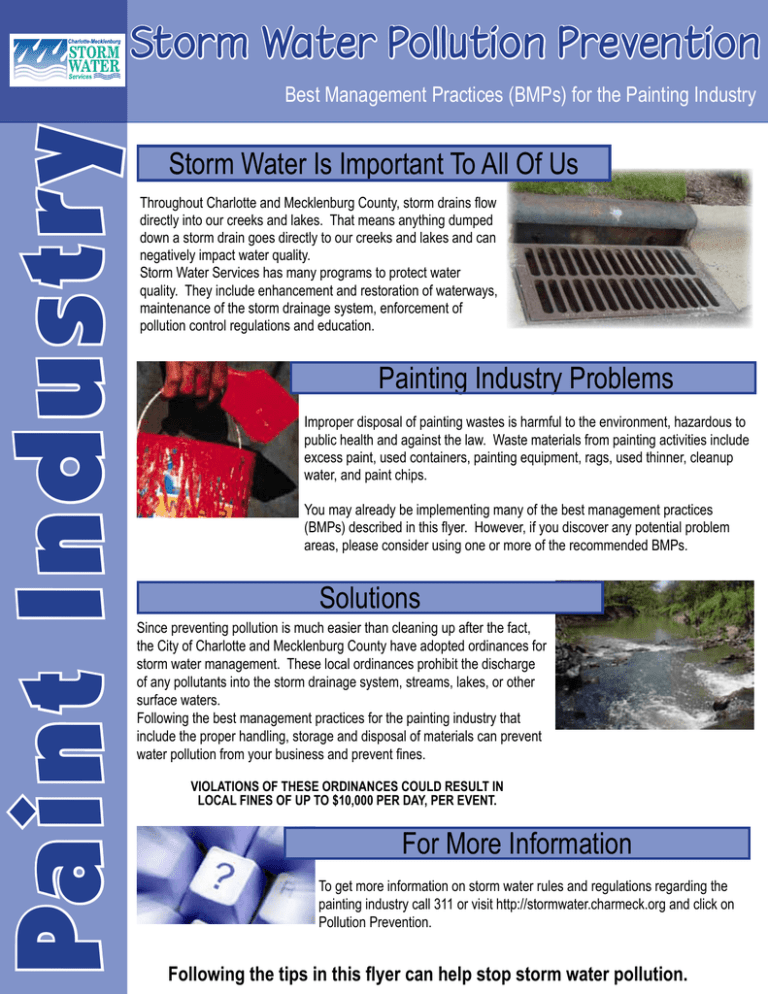
Paint Industr y Storm Water Pollution Prevention Best Management Practices (BMPs) for the Painting Industry Storm Water Is Important To All Of Us Throughout Charlotte and Mecklenburg County, storm drains flow directly into our creeks and lakes. That means anything dumped down a storm drain goes directly to our creeks and lakes and can negatively impact water quality. Storm Water Services has many programs to protect water quality. They include enhancement and restoration of waterways, maintenance of the storm drainage system, enforcement of pollution control regulations and education. Painting Industry Problems Improper disposal of painting wastes is harmful to the environment, hazardous to public health and against the law. Waste materials from painting activities include excess paint, used containers, painting equipment, rags, used thinner, cleanup water, and paint chips. You may already be implementing many of the best management practices (BMPs) described in this flyer. However, if you discover any potential problem areas, please consider using one or more of the recommended BMPs. Solutions Since preventing pollution is much easier than cleaning up after the fact, the City of Charlotte and Mecklenburg County have adopted ordinances for storm water management. These local ordinances prohibit the discharge of any pollutants into the storm drainage system, streams, lakes, or other surface waters. Following the best management practices for the painting industry that include the proper handling, storage and disposal of materials can prevent water pollution from your business and prevent fines. Violations of these ordinances could result in local fines of up to $10,000 per day, per event. For More Information To get more information on storm water rules and regulations regarding the painting industry call 311 or visit http://stormwater.charmeck.org and click on Pollution Prevention. Following the tips in this flyer can help stop storm water pollution. Paint Prep and Removal 66 Protect or cover storm drains when pressure washing a structure to remove paint. 66 Spread a tarp to capture paint chips when removing old paint. 66 Paint chips and dust from non-hazardous dry stripping and sand blasting may be swept up and disposed of as trash. 66 Chips and dust from paint containing lead is hazardous waste (most paint prior to 1978 contains lead). Follow safe work practices when working with lead paint. Sweep up waste and dispose of as hazardous waste. Painting Cleanup 66 Never clean brushes or rinse equipment any place where the wastewater may run into a street, storm drain or stream. 66 For water-based (latex) paint, rinse and dispose of wastewater to the sanitary sewer. 66 For oil-based paint, use paint thinner for cleaning. 66 Use up excess paint or donate it to a school, club or charitable organization that can use it. 66 Water-based (latex) paint may be disposed of in the trash once it is completely dry. Oil-based paint and aerosol cans are hazardous waste and cannot be disposed of with regular trash. Wastewater Disposal 66 Discharge wastewater from water-based (latex) painting activities only into a drain connected to the sanitary sewer system. 66 Wastewater from oil-based painting activities is hazardous waste and cannot be disposed of into the sanitary sewer. 66 Do not lift a sewer manhole to discharge wastewater – it is illegal to do so. 66 Check with Charlotte-Mecklenburg Utilities about other requirements for discharge to the sanitary sewer. Call 311. Spills 66 To avoid spills and exposure to storm water, place lids on paint cans when not in use and store them under cover. 66 When transporting paint containers in a vehicle, properly secure the containers to ensure that spills do not occur. 66 Carry spill response materials on business vehicles in case a spill occurs. 66 Do not hose down outside spills. 66 Report spills and leaks that enter the storm drain system to 311. Employee Training 66 Train all employees upon hiring and each year thereafter. 66 Post these Best Management Practices where employees can see them. 66 Report illegal dumping by calling 311. Visit stormwater.charmeck.org and click on Pollution Prevention for more information.
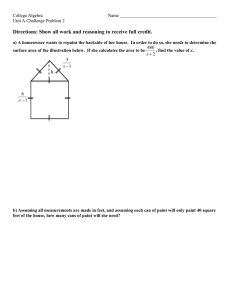
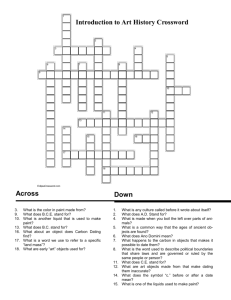
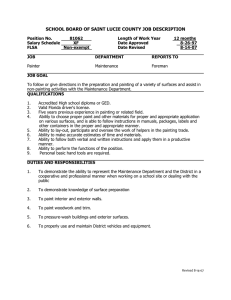
![[Agency] recognizes the hazards of lead](http://s3.studylib.net/store/data/007301017_1-adfa0391c2b089b3fd379ee34c4ce940-300x300.png)
